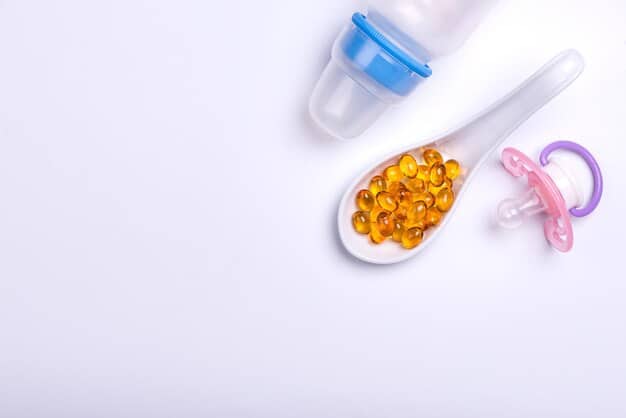Is Your Baby Getting Enough Vitamin D? 2025 US Guidelines

Ensuring adequate vitamin D intake is crucial for infants in the US, and understanding the updated 2025 guidelines can help parents and caregivers make informed decisions about supplementation and sun exposure to support their baby’s healthy development.
Is your baby getting enough vitamin D? This is a question on the minds of many parents, especially with evolving health guidelines. The updated 2025 guidelines for US infants shed light on the importance of vitamin D for your baby’s growth and development. Let’s delve into the details and ensure your little one thrives with the right amount of this vital nutrient.
Vitamin D: Why It Matters for Infants
Vitamin D is an essential nutrient that plays a critical role in your baby’s health, impacting everything from bone development to immune function. Understanding its importance is the first step in ensuring your little one receives an adequate amount.
The primary role of vitamin D is to help the body absorb calcium and phosphorus, both of which are crucial for building strong bones and teeth. Without sufficient vitamin D, babies are at risk of developing rickets, a condition that can cause weak or deformed bones.
Key Benefits of Vitamin D
- Supports Bone Growth: Vitamin D promotes the absorption of calcium, essential for healthy bone development.
- Boosts Immune System: Adequate vitamin D levels can help strengthen your baby’s immune system, reducing the risk of infections.
- Regulates Cell Growth: Vitamin D plays a role in cell growth and differentiation, contributing to overall healthy development.
Moreover, vitamin D is believed to influence immune function. Some studies suggest that adequate levels can help reduce the risk of certain infections and autoimmune diseases later in life. It also plays a role in cell growth and differentiation, contributing to overall healthy development.
In conclusion, vitamin D is not just about bone health; it’s a cornerstone of your baby’s overall development. Ensuring your infant gets enough vitamin D is a proactive step towards fostering a strong, healthy future.
Updated 2025 Guidelines for Vitamin D Intake

Staying informed about the latest recommendations for vitamin D intake is crucial for all parents. The 2025 updated guidelines provide clear and concise information, helping you make the best choices for your baby’s health.
The American Academy of Pediatrics (AAP) has updated its guidelines to reflect new research and insights into vitamin D requirements for infants. These guidelines aim to ensure babies receive the optimal amount of vitamin D to support their rapid growth and development.
Recommended Daily Intake
- Infants aged 0-12 months: The recommended daily intake is 400 International Units (IU) or 10 micrograms (mcg) of vitamin D.
- Importance of Supplementation: Because breast milk often does not provide sufficient vitamin D, supplementation is typically recommended for breastfed infants.
- Formula-Fed Infants: Formula-fed infants may also need supplementation if they are not consuming at least 32 ounces of vitamin D-fortified formula per day.
It’s important to note that these guidelines are designed to prevent vitamin D deficiency and promote optimal bone health. Exceeding the recommended daily intake is not likely to provide additional benefits and may even pose risks.
Following these updated 2025 guidelines can help you ensure your baby is getting the right amount of vitamin D, setting the stage for a lifetime of good health.
Sources of Vitamin D for Your Baby
Understanding the various sources of vitamin D can empower you to make informed decisions about how to best meet your baby’s nutritional needs. While sunlight, diet, and supplements are all potential options, some are more reliable and practical than others.
There are several ways your baby can obtain vitamin D, each with its own set of considerations.
Sunlight Exposure
Sunlight triggers vitamin D synthesis in the skin. However, relying solely on sunlight for vitamin D is not recommended for infants due to the risk of sunburn and skin damage. The AAP advises against prolonged sun exposure for babies and recommends alternative sources of vitamin D.
Dietary Sources
Few foods naturally contain significant amounts of vitamin D. Breast milk typically provides only small amounts, usually not enough to meet an infant’s daily needs. Formula, on the other hand, is often fortified with vitamin D.
Vitamin D Supplements

Due to the limitations of sunlight and dietary sources, vitamin D supplements are frequently recommended for infants. These supplements are available in liquid form and can be easily administered with a dropper.
In summary, while sunlight and diet can play a role, vitamin D supplementation is often the most reliable and practical way to ensure your baby receives an adequate amount of this essential nutrient.
How to Choose the Right Vitamin D Supplement
Selecting the appropriate vitamin D supplement for your baby can seem daunting, but understanding a few key factors can simplify the process and ensure you’re making a safe and effective choice.
Not all vitamin D supplements are created equal. Here’s what to consider when choosing a supplement for your baby:
- Form: Liquid drops are generally preferred for infants due to ease of administration.
- Dosage: Ensure the supplement provides the recommended 400 IU (10 mcg) of vitamin D per dose.
Important Considerations
When choosing a supplement, look for products that are specifically formulated for infants and children. These supplements are typically free of artificial colors, flavors, and preservatives. Also, be sure to check the expiration date and storage instructions.
With the right information, you can confidently choose a vitamin D supplement that meets your baby’s needs and supports their healthy development. Consulting with your pediatrician is always a good idea to personalize this choice for your baby’s specific health profile.
Recognizing Vitamin D Deficiency in Infants
Being aware of the signs and symptoms of vitamin D deficiency can help you take prompt action to address the issue and protect your baby’s health. While deficiency is often subtle, certain indicators can raise a red flag.
Vitamin D deficiency can manifest in various ways, though it’s not always easy to spot. Some common signs may include:
- Delayed Motor Development: Babies with vitamin D deficiency may experience delays in reaching developmental milestones, such as sitting, crawling, or walking.
- Weakness: Muscle weakness can be a sign of vitamin D deficiency, making it harder for babies to support their weight.
Consulting a Healthcare Professional
If you suspect your baby may be deficient in vitamin D, it’s essential to consult with your pediatrician. They can perform a physical exam and order blood tests to assess your baby’s vitamin D levels. Early detection and treatment are key to preventing long-term health problems associated with vitamin D deficiency.
By staying informed about the signs of vitamin D deficiency and seeking timely medical advice, you can ensure your baby receives the care they need to thrive.
Practical Tips for Parents to Ensure Adequate Vitamin D Intake
As a parent, you play a pivotal role in ensuring your baby gets enough vitamin D. By implementing these practical tips, you can make vitamin D supplementation a seamless part of your baby’s routine.
Here are some strategies to incorporate vitamin D into your baby’s daily life effectively:
- Establish a Routine: Make vitamin D supplementation a consistent part of your daily routine. For example, give your baby the supplement at the same time each day, such as during morning feeding.
- Use the Right Dosage: Double-check the dosage instructions on the supplement label to ensure you’re giving your baby the correct amount. Use the dropper provided with the supplement for accurate measurement.
Creating a Positive Experience
Make the process as pleasant as possible for your baby. Giving the supplement directly into their mouth can sometimes be challenging, so try mixing it with a small amount of breast milk or formula. Also, choose a time when your baby is calm and relaxed.
By integrating these practical tips into your daily routine, you can ensure your baby consistently receives the right amount of vitamin D, contributing to their long-term health and well-being.
| Key Point | Brief Description |
|---|---|
| 💪 Importance of Vitamin D | Essential for bone growth, immune support, and cell regulation in infants. |
| ☀️ Sources | Sunlight, fortified formula, and supplements are key; supplements are often recommended. |
| ✅ Recommended Intake | 400 IU (10 mcg) daily for infants 0-12 months, as per 2025 guidelines. |
| 🔎 Deficiency Signs | Watch for delayed motor skills and muscle weakness; consult a pediatrician if concerned. |
Frequently Asked Questions
▼
Vitamin D helps your baby absorb calcium and phosphorus, which are crucial for strong bones and teeth. It also supports immune function and overall healthy development.
▼
According to the updated 2025 guidelines, infants aged 0-12 months need 400 International Units (IU) or 10 micrograms (mcg) of vitamin D per day to prevent deficiency.
▼
While sunlight is a source, it’s not recommended for babies. Breast milk often lacks sufficient vitamin D, so supplementation is advised. Formula-fed infants need vitamin D-fortified formula.
▼
Opt for liquid drops specifically formulated for infants, ensuring they provide 400 IU per dose. Check for artificial additives and consult your pediatrician for recommendations.
▼
Signs include delayed motor development, muscle weakness, and soft skull bones. If you suspect deficiency, consult your pediatrician for a thorough evaluation and blood tests.
Conclusion
Ensuring your baby receives adequate vitamin D is a crucial step in supporting their healthy development. By staying informed about the updated 2025 guidelines, choosing the right sources of vitamin D, and recognizing the signs of deficiency, you can confidently provide your little one with the nutrients they need to thrive. Remember to consult with your pediatrician for personalized advice tailored to your baby’s specific health needs.





